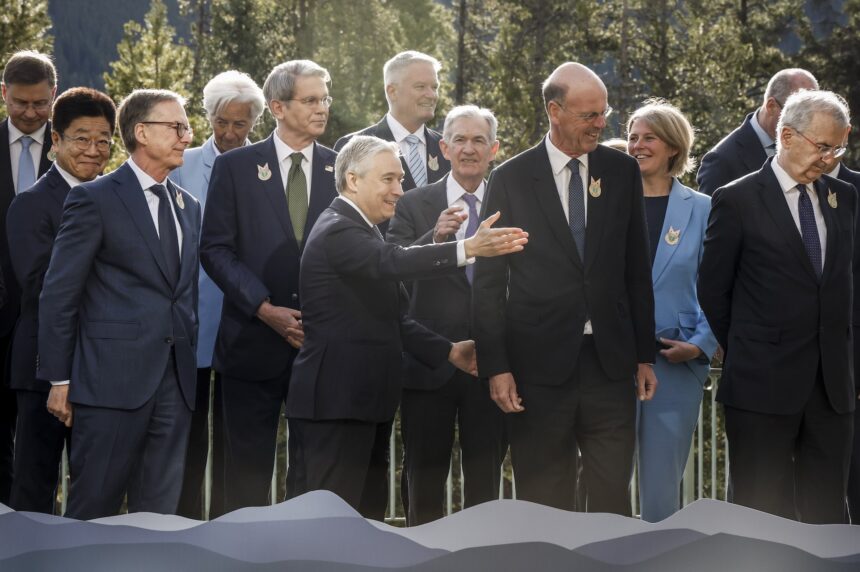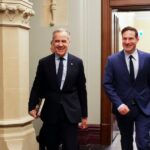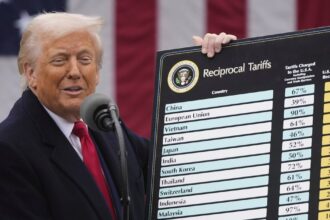The grand corridors of Stresa, Italy, echoed with pointed rhetoric against unfair trade practices this weekend, as G7 finance ministers assembled for their annual summit against a backdrop of escalating global economic tensions. Yet in a striking display of diplomatic choreography, the group’s final communiqué managed to condemn “market-distorting practices” while delicately avoiding direct criticism of the United States’ recent protectionist measures.
Finance ministers from the world’s most advanced economies released a carefully worded joint statement Saturday, expressing “significant concerns” about industrial policies that create uneven competitive landscapes. The language appeared tailored to address China’s state subsidies and industrial practices without explicitly naming Beijing—a recurring diplomatic strategy among Western powers.
“Market-distorting practices undermine the functioning of the global economy,” the ministers declared in their consensus document. “We will protect our economies from unfair practices, including economic coercion.”
The summit unfolded just weeks after U.S. President Joe Biden announced plans to increase tariffs on $18 billion worth of Chinese imports, including steel, aluminum, semiconductors, and electric vehicles—doubling duties on some products to 25%. This move represents the latest escalation in Washington’s ongoing effort to reshape global trade dynamics and protect domestic industries.
Canadian Finance Minister Chrystia Freeland, while not directly addressing U.S. tariff policies, emphasized Canada’s commitment to “a rules-based international economic order” during a press briefing. “Our prosperity depends on fair competition and transparent market access,” Freeland noted, highlighting Canada’s particular vulnerability to protectionist measures given its deep economic integration with the United States.
Economic analysts monitoring the summit noted the careful linguistic balancing act. “The G7 ministers are threading a diplomatic needle,” explained Dr. Margaret Chen, senior economist at the Global Trade Institute. “They’re attempting to present a unified front against certain trade practices while avoiding internal confrontation over inconsistencies within their own ranks.”
The communiqué’s omission of U.S. tariff policies stands in stark contrast to previous G7 gatherings, particularly the contentious 2018 summit in Charlevoix, Quebec, where leaders openly challenged then-President Donald Trump’s aggressive tariff strategy. This year’s more measured approach suggests an evolving coalition strategy focused on countering China’s economic influence rather than addressing disagreements among Western allies.
Beyond trade concerns, the finance ministers tackled several pressing economic challenges, including the ongoing effort to implement a global minimum corporate tax rate, strategies to address sovereign debt in developing nations, and mechanisms to track Russian assets frozen after Moscow’s invasion of Ukraine.
The ministers also addressed artificial intelligence regulation, cryptocurrency oversight, and climate finance—areas where international cooperation appears more forthcoming than in trade policy. On climate specifically, the group reaffirmed commitments to mobilize $100 billion annually for developing nations’ climate initiatives, though implementation details remain nebulous.
For Canada, which maintains significant trade relationships with both the United States and China, navigating this increasingly complex economic landscape presents particular challenges. Canadian officials have consistently advocated for multilateral approaches to trade disputes while quietly expressing concerns about being caught between competing tariff regimes.
As global trade tensions continue to simmer, the question remains: can the world’s leading economies forge a coherent approach to fair trade that addresses legitimate concerns without descending into destructive protectionism? The G7’s diplomatic sidestep in Stresa suggests that answer remains elusive, even among supposed allies.










